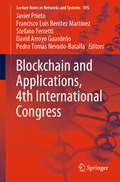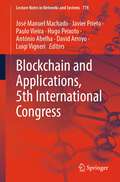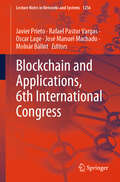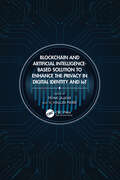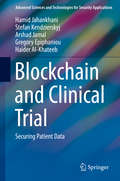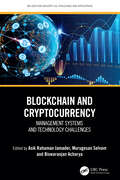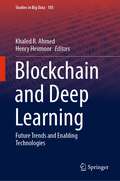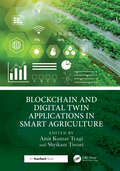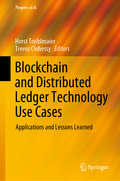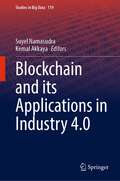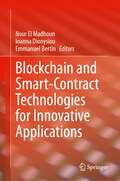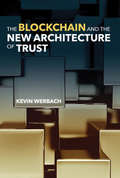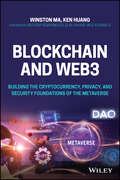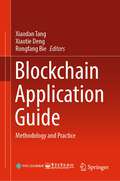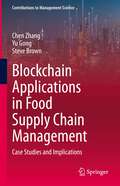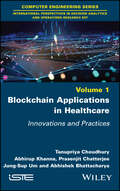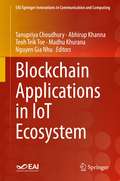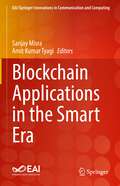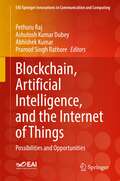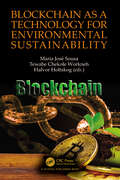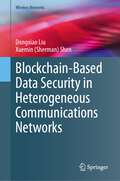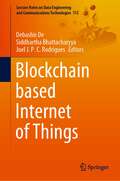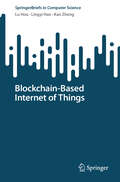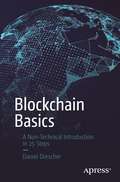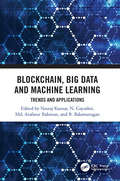- Table View
- List View
Blockchain and Applications, 4th International Congress (Lecture Notes in Networks and Systems #595)
by Javier Prieto Francisco Luis Benítez Martínez Stefano Ferretti David Arroyo Guardeño Pedro Tomás Nevado-BatallaThis book constitutes the refereed proceedings of the 4th International Congress on Blockchain and Applications 2022, BLOCKCHAIN’22, held in L’Aquila, Italy, in July 2022. Among the scientific community, blockchain and artificial intelligence are a promising combination that will transform the production and manufacturing industry, media, finance, insurance, e-government, etc. Nevertheless, there is no consensus with schemes or best practices that would specify how blockchain and artificial intelligence should be used together.The 37 full papers presented in the main track were carefully reviewed and selected from more than 75 submissions. They contain the latest advances on blockchain and artificial intelligence and on their application domains, exploring innovative ideas, guidelines, theories, models, technologies, and tools and identifying critical issues and challenges that researchers and practitioners must deal with in the future research. The book also includes 3 papers from the WEB3-TRUST workshop and 2 papers from the Doctoral Consortium.
Blockchain and Applications, 5th International Congress (Lecture Notes in Networks and Systems #778)
by José Manuel Machado Javier Prieto Paulo Vieira Hugo Peixoto António Abelha David Arroyo Luigi VigneriThis book constitutes the refereed proceedings of the 5th International Congress on Blockchain and Applications 2023, BLOCKCHAIN’23, held in Guimarães, Portugal, in July 2023. Among the scientific community, blockchain and artificial intelligence are a promising combination that will transform the production and manufacturing industry, media, finance, insurance, e-government, etc. Nevertheless, there is no consensus with schemes or best practices that would specify how blockchain and artificial intelligence should be used together. The full papers presented in the main track were carefully reviewed. They contain the latest advances on blockchain and artificial intelligence and on their application domains, exploring innovative ideas, guidelines, theories, models, technologies, and tools and identifying critical issues and challenges that researchers and practitioners must deal with in the future research. The authors would like to thank all the contributing authors, the members of the Program Committees, the sponsors, and the Organizing Committee of the University of Minho and the University of Salamanca for their hard and highly valuable work.
Blockchain and Applications, 6th International Congress (Lecture Notes in Networks and Systems #1256)
by Javier Prieto Rafael Pastor Vargas Oscar Lage José Manuel Machado Molnár BálintThis book compiles the proceedings of 6th International Congress on Blockchain and Applications 2024 (BLOCKCHAIN’24), held in Salamanca, Spain, in June 2024. The book includes 31 full papers presented in the main track that were selected among 51 submissions, highlighting theoretical advances and practical implementation of blockchain and distributed ledger technologies (DLTs). In addition, it contains 9 papers from the associated workshops and doctoral consortium that cover topics such as cybersecurity, legal aspects, and climate action. Blockchain and DLTs have revolutionized the scientific community by enabling breakthroughs in secure, decentralized data management, fostering transparency, and collaboration. Researchers are boosting innovation in areas like smart contracts, consensus algorithms, and governance models. In combination with cutting-edge technologies such as AI, metaverse, or quantum computing, blockchain and DLTs are shaping the future of digital trust and innovation.
Blockchain and Artificial Intelligence-Based Solution to Enhance the Privacy in Digital Identity and IoT
by Fehmi Jaafar Schallum PierreThe chapters in this book explore the main domains that represent considerable risks for the respect of privacy, such as education, health, finance or social media. Through its place in the massive data production industry, the Internet of Things participates in the development of artificial intelligence and is increasingly attracting the attention of web giants, governments and especially all types of hackers. Thanks to this book, private and public organizations will have at their disposal a tool that highlights, on the one hand, the major challenges raised by privacy in the context of the Internet of Things and, on the other hand, recommendations for improving good practices. Digital identity is presented as a bulwark for the protection of privacy. It opens up new avenues for improving digital trust. Concretely, there are a set of challenges that are associated with the management of digital identity, mainly in relation to the compliance and governance of personnel data in order to eliminate privacy and security risks.
Blockchain and Clinical Trial: Securing Patient Data (Advanced Sciences and Technologies for Security Applications)
by Hamid Jahankhani Stefan Kendzierskyj Arshad Jamal Gregory Epiphaniou Haider Al-KhateebThis book aims to highlight the gaps and the transparency issues in the clinical research and trials processes and how there is a lack of information flowing back to researchers and patients involved in those trials. Lack of data transparency is an underlying theme within the clinical research world and causes issues of corruption, fraud, errors and a problem of reproducibility. Blockchain can prove to be a method to ensure a much more joined up and integrated approach to data sharing and improving patient outcomes. Surveys undertaken by creditable organisations in the healthcare industry are analysed in this book that show strong support for using blockchain technology regarding strengthening data security, interoperability and a range of beneficial use cases where mostly all respondents of the surveys believe blockchain will be important for the future of the healthcare industry. Another aspect considered in the book is the coming surge of healthcare wearables using Internet of Things (IoT) and the prediction that the current capacity of centralised networks will not cope with the demands of data storage. The benefits are great for clinical research, but will add more pressure to the transparency of clinical trials and how this is managed unless a secure mechanism like, blockchain is used.
Blockchain and Cryptocurrency: Management Systems and Technology Challenges (Big Data for Industry 4.0)
by Asik Rahaman Jamader, Murugesan Selvam and Biswaranjan AcharyaBlockchain and cryptocurrency have become the most revolutionary technologies of the 21st century, potentially transforming how we conduct business, manage assets, and exchange value. The emergence of these technologies has challenged traditional systems of management and has presented new technology challenges for businesses and organizations.Blockchain and Cryptocurrency: Management Systems and Technology Challenges explores the latest developments in blockchain and cryptocurrency and how they are changing the way we manage systems and technologies. The book delves into the technical aspects of blockchain, including its underlying architecture and consensus mechanisms, and examines the various use cases for blockchain technology, such as supply chain management, digital identity, and smart contracts. It also discusses the challenges of managing and implementing blockchain and cryptocurrency systems, including regulatory compliance, security, and scalability. Looking at the impact of these technologies on various industries, such as finance, healthcare, and energy, the book examines how they are changing how businesses now operate.A comprehensive guide for professionals in engineering management, business leadership, and technology that provides a comprehensive understanding of blockchain and cryptocurrencies' potential impact on organizations.
Blockchain and Deep Learning: Future Trends and Enabling Technologies (Studies in Big Data #105)
by Khaled R. Ahmed Henry HexmoorThis book introduces to blockchain and deep learning and explores and illustrates the current and new trends that integrate them. The pace and speeds for connectivity are certain on the ascend. Blockchain and deep learning are twin technologies that are integral to integrity and relevance of network contents. Since they are data-driven technologies, rapidly growing interests exist to incorporate them in efficient and secure data sharing and analysis applications. Blockchain and deep learning are sentinel contemporary research technologies. This book provides a comprehensive reference for blockchain and deep learning by covering all important topics. It identifies the bedrock principles and forward projecting methodologies that illuminate the trajectory of developments for the decades ahead.
Blockchain and Digital Twin Applications in Smart Agriculture
by Amit Kumar Tyagi Shrikant TiwariBlockchain and Digital Twin Applications in Smart Agriculture presents scenarios, solutions, applications to optimize crop management, improve resource allocation, and enhance sustainability in modern farming practices. It examines how blockchain and digital twin technology could enable farmers and stakeholders to create virtual, data-driven replicas of their agricultural operations while leveraging the security and transparency of blockchain technology. Highlights of the book include: An immutable blockchain ledger for storing and sharing agricultural data securely Decentralized data management to share data among such stakeholders as farmers, suppliers, distributors, and consumers Supply chain transparency to ensure product authenticity, reduce food fraud, and protect consumers Solutions to improve the allocation of such resources as water, fertilizer, and labor to reduce costs and improve productivity. The book helps researchers and academics develop solutions that can transition the agricultural industry into a more data-driven, sustainable, and transparent future. It explains how creating digital twins of agricultural operations and securing data through blockchain can enhance the ability to make informed decisions, reduce waste, and ensure that agriculture practices are more efficient and environmentally responsible. Featuring practical applications and case studies, the book provides a roadmap to farming that is smart, data-driven, and more.
Blockchain and Distributed Ledger Technology Use Cases: Applications and Lessons Learned (Progress in IS)
by Horst Treiblmaier Trevor ClohessyBlockchain and other trustless systems have gone from being relatively obscure technologies, which were only known to a small community of computer scientists and cryptologists, to mainstream phenomena that are now considered powerful game changers for many industries. This book explores and assesses real-world use cases and case studies on blockchain and related technologies. The studies describe the respective applications and address how these technologies have been deployed, the rationale behind their application, and finally, their outcomes. The book shares a wealth of experiences and lessons learned regarding financial markets, energy, SCM, healthcare, law and compliance. Given its scope, it is chiefly intended for academics and practitioners who want to learn more about blockchain applications.
Blockchain and its Applications in Industry 4.0 (Studies in Big Data #119)
by Suyel Namasudra Kemal AkkayaThis book discusses fundamentals of Blockchain technology and Industry 4.0. It discusses many applications of Blockchain technology in Industry 4.0, including integration of AI, IoT, and big data with Blockchain for Industry 4.0. It provides cutting-edge research content from researchers, academicians, and other professionals from different background areas to show their state-of-the-art knowledge to use Blockchain in Industry 4.0. The book discusses advantages of Industry 4.0, such as improved productivity, improved efficiency, flexibility, agility, better user experience, and many more, and also entails some challenges too, such as trust, traceability, security, reliability, transparency, etc., for creating an application of Industry 4.0. The book helps graduate, postgraduate, doctoral students, and industrial professionals to implement Blockchain in Industry 4.0.
Blockchain and Smart-Contract Technologies for Innovative Applications
by Nour El Madhoun Ioanna Dionysiou Emmanuel BertinThis book is an in-depth exploration of blockchain and smart contracts technologies, systematically addressing their theoretical foundations while highlighting concrete applications in several key sectors. It begins by defining the fundamentals of blockchain and smart contracts, then ventures into the legal domain, analyzing the implications of automated contracts from both backend and frontend perspectives. A particular focus is placed on a sustainable design for cryptocurrencies, anticipating the principles and expectations of the future. The book then provides a detailed taxonomy of blockchain's financial applications, while also examining its role in managing scientific workflows. The fascinating world of NFTs is also explored, from the tokenization of fine arts to innovative event ticketing systems. The convergence between ontologies and blockchain technology is then highlighted, followed by an in-depth assessment of the implications of this technology in the telecommunicationssector, including a SWOT analysis of next-generation cellular networks. Written by academic researchers and industry experts, this book offers a complete and nuanced perspective on the transformational potential of blockchain.
The Blockchain and the New Architecture of Trust (Information Policy)
by Kevin WerbachHow the blockchain—a system built on foundations of mutual mistrust—can become trustworthy.The blockchain entered the world on January 3, 2009, introducing an innovative new trust architecture: an environment in which users trust a system—for example, a shared ledger of information—without necessarily trusting any of its components. The cryptocurrency Bitcoin is the most famous implementation of the blockchain, but hundreds of other companies have been founded and billions of dollars invested in similar applications since Bitcoin's launch. Some see the blockchain as offering more opportunities for criminal behavior than benefits to society. In this book, Kevin Werbach shows how a technology resting on foundations of mutual mistrust can become trustworthy. The blockchain, built on open software and decentralized foundations that allow anyone to participate, seems like a threat to any form of regulation. In fact, Werbach argues, law and the blockchain need each other. Blockchain systems that ignore law and governance are likely to fail, or to become outlaw technologies irrelevant to the mainstream economy. That, Werbach cautions, would be a tragic waste of potential. If, however, we recognize the blockchain as a kind of legal technology that shapes behavior in new ways, it can be harnessed to create tremendous business and social value.
Blockchain and Web3: Building the Cryptocurrency, Privacy, and Security Foundations of the Metaverse
by Winston Ma Ken HuangAn in-depth and authoritative treatment of one of the most pressing topics of our time In Blockchain and Web3: Building the Cryptocurrency, Privacy, and Security Foundations of the Metaverse, two tech and finance experts deliver a comprehensive and accessible guide to the present and future of blockchain technology and how it will form the foundation of a new, better internet. To support a concept as bold as the Metaverse, we need several orders of magnitude more powerful computing capability, accessible at much lower latencies, across a multitude of devices and screens. You&’ll discover how blockchain can accelerate data flow, exchange, and transactions to create and transfer value around the world and, at the same time, how it can be used to protect user data privacy and security with decentralized web infrastructures. The book also includes: Discussions of how sovereign governments are entering the blockchain fray and how their entry, especially with CBDC digital currency, shapes the conversations around Web3 Explorations of whether we will ever realize the holy grail of blockchain tech: interoperability to compete with Big Tech platformsDiscussion of new security and privacy issues rising from the intersection of Blockchain, Web3 and Metaverse.A fascinating and eye-opening treatment of the past, present, and future of blockchain and the role it will play on the internet and metaverse, Blockchain and Web3 is a truly original and engaging discussion of a timely and critical topic.
Blockchain Application Guide: Methodology and Practice
by Xiaodan Tang Xiaotie Deng Rongfang BieThis book focuses on progress, concerns and approaches of blockchain application. It summarizes basic concepts, principles and standardization of blockchain technology, as well as the status of blockchain application and industry. It provides an ecology model and an evaluation method for blockchain applications and analyses the governance of blockchain applications. It presents application values and practices in financial services, logistics, government service, culture and education, and people’s livelihood and includes analysis of scenarios and use cases. This book is a summary of the experience of more than 20 experts from enterprises and institutions active in the blockchain industry. It provides a panorama of blockchain applications for users, technology and service providers, application developers and operators and supervisors.
Blockchain Applications in Food Supply Chain Management: Case Studies and Implications (Contributions to Management Science)
by Chen Zhang Yu Gong Steve BrownThis book contributes to blockchain applications in food supply chain management from both theoretical and practical perspectives. By using the case study research method, it empirically investigates why and how food companies implement blockchain technology. Moreover, it proposes a conceptual framework based on the case findings and extant literature. The book provides empirical evidence to verify academic findings such as critical success factors and barriers. Furthermore, it identifies the implementation process to answer the ‘how’ question. Uniquely, it applies the innovation process model and the practice-based view (PBV) to studies on food supply chains and blockchain. Thus, building on the original model and theory, it enriches the theory on blockchain implementation, making it a valuable asset for all researchers and practitioners interested in blockchain adoption and food supply chain management.
Blockchain Applications in Healthcare: Innovations and Practices
by Tanupriya ChoudhuryBlockchain is new-age technology used to track every transaction using cryptocurrency across servers linked in a peer-to-peer network, enabling transactions to be secure, transparent and reliable. Retaining an efficient, secure and patient-centric healthcare industry has never been so important, especially due to the damaging effects of the Covid-19 pandemic. The applicability of Blockchain in the healthcare domain can be seen as a remarkable opportunity for researchers and scientists to solve real-world problems. This book focuses on the fundamentals of Blockchain technology along with the methods of its integration with the healthcare industry. It also provides an enhanced understanding of Blockchain technology, AI and IoT across the various application areas of the healthcare industry. Furthermore, throughout the book, areas of relevant applications, such as patient data privacy protection, pharmaceutical supply chains and genomics are discussed.
Blockchain Applications in IoT Ecosystem (EAI/Springer Innovations in Communication and Computing)
by Tanupriya Choudhury Abhirup Khanna Teoh Teik Toe Madhu Khurana Nguyen Gia NhuThis book focuses on the fundamentals of blockchain technology along with the means and methods of its integration with Internet of Things (IoT). The book allows the reader to have a deeper understanding of blockchain technology, IoT and various application areas wherein both technologies can be implemented. The book serves the purpose of providing knowledge about the fundamentals of blockchain and IoT to a common reader along with allowing a research scholar to identify some futuristic problem areas that emerge from the convergence of both technologies. Furthermore, the authors discuss relevant application areas such as smart city, e-healthcare, smart travel, etc. throughout the course of the book. The book also talks through a few case studies illustrating the implementation and benefits of using blockchain and IoT. Provides a comprehensive view of blockchain technology and its integration with IoT;Facilitates in having a valuable understanding of various application areas pertaining to blockchain and IoT;Assists the reader in exploring new research areas wherein blockchain and IoT can find their applicability based upon their list of benefits.
Blockchain Applications in the Smart Era (EAI/Springer Innovations in Communication and Computing)
by Sanjay Misra Amit Kumar TyagiThis book covers a variety of topics and trends related to blockchain technology for smart era applications. The applications span industries such as health, government, energy management, manufacturing, finance, information systems, all far beyond blockchain's original use in cryptocurrency. The authors present variants, new models, practical solutions, and technological advances related to blockchain in these fields and more. The applications within these fields include blockchain and cyber-security, IoT security and privacy using blockchain, and blockchain in industries and society . A variety of case studies are also included. The book is applicable to researchers, professionals, students, and professors in a variety of fields in communications engineering.
Blockchain, Artificial Intelligence, and the Internet of Things: Possibilities and Opportunities (EAI/Springer Innovations in Communication and Computing)
by Pethuru Raj Ashutosh Kumar Dubey Abhishek Kumar Pramod Singh RathoreThis book provides basic concepts and deep knowledge about various security mechanisms that can be implemented in IoT through Blockchain technology. This book aids readers in gaining insight and knowledge about providing security and solutions to different challenges in IoT using Blockchain technology. This book primarily focuses on challenges to addressing the integration of the IoT with Blockchain with respect to potential benefits for IoT. This book gives descriptive analysis of Blockchain integrated with IoT applications and platforms for the development of IoT solutions along with possible topologies to that integration. Several application examples are included in a variety of industries.
Blockchain as a Technology for Environmental Sustainability
by Halvor Holtskog Maria José Tewabe Chekole WorknehAt a time of growing environmental concerns and an urgent need for sustainable solutions, the intersection of blockchain technology and environmental sustainability is emerging as a powerful force for positive change. The environmental challenges of our time, including climate change, resource scarcity and the destruction of ecosystems, require innovative solutions that transcend geographical and political boundaries. Blockchain technology, with its decentralized and transparent nature, can not only track and verify environmental efforts, but also incentivize them.
Blockchain-Based Data Security in Heterogeneous Communications Networks (Wireless Networks)
by Dongxiao Liu Xuemin (Sherman) ShenThis book investigates data security approaches in Heterogeneous Communications Networks (HCN). First, the book discusses the urgent need for a decentralized data management architecture in HCN. The book investigates preliminaries and related research to help readers obtain a comprehensive picture of the research topic. Second, the book presents three blockchain-based approaches for data management in HCN: data provenance, data query, and data marketing. Finally, based on the insights and experiences from the presented approaches, the book discusses future research directions.
Blockchain based Internet of Things (Lecture Notes on Data Engineering and Communications Technologies #112)
by Debashis De Siddhartha Bhattacharyya Joel J. P. C. RodriguesThe book is aimed to foster knowledge based on Blockchain technology highlighting on the framework basics, operating principles and different incarnations. The fundamental problems encountered in existing blockchain architectures and means for removing those would be covered. It would also touch upon blockchain based IoT systems and applications. The book covers applications and use cases of blockchain technology for industrial IoT systems. In addition, methods for inducing computational intelligence into existing blockchain frameworks thereby thwarting most of the limitations are also discussed. The readers would benefit from the rich technical content in this rapidly emerging field thereby enabling a skilled workforce for the future.
Blockchain-Based Internet of Things (SpringerBriefs in Computer Science)
by Lu Hou Lingyi Han Kan ZhengThis book focuses on the integration of blockchain technology for IoT systems, exploring the methodologies behind each component of the system to bolster the data security and protect privacy. It also discusses the essential algorithms necessary for the efficient implementation of blockchain in IoT systems to provide security and privacy. With the advancement of Internet of Things (IoT), ensuring data security and privacy has become a critical concern due to the significant economic value associated with IoT data. This book presents algorithms that encompass the processes, starting with the generation of a block containing IoT data to the finalization of the consensus. These algorithms provide realistic methods for effectively integrating blockchain into IoT systems. The primary objective is to thoroughly examine the process of integrating decentralization paradigm into a conventional centralized system to address persistent problems. This book is appropriate for advanced-level students in computer science and electrical engineering, who are studying relevant subjects such as the Internet of Things, blockchain, wireless communications and artificial intelligence. Researchers and professionals working in blockchain-based IoT or equivalent fields will want to purchase this book as well.
Blockchain Basics: A Non-Technical Introduction in 25 Steps
by Daniel DrescherIn 25 concise steps, you will learn the basics of blockchain technology. No mathematical formulas, program code, or computer science jargon are used. No previous knowledge in computer science, mathematics, programming, or cryptography is required. Terminology is explained through pictures, analogies, and metaphors. This book bridges the gap that exists between purely technical books about the blockchain and purely business-focused books. It does so by explaining both the technical concepts that make up the blockchain and their role in business-relevant applications. What You Will Learn: What the blockchain is Why it is needed and what problem it solves Why there is so much excitement about the blockchain and its potential Major components and their purpose How various components of the blockchain work and interact Limitations, why they exist, and what has been done to overcome them Major application scenarios Who This Book Is For: Everyone who wants to get a general idea of what blockchain technology is, how it works, and how it will potentially change the financial system as we know it
Blockchain, Big Data and Machine Learning: Trends and Applications
by Neeraj Kumar; N. Gayathri; Md. Arafatur Rahman; B. BalamuruganPresent book covers new paradigms in Blockchain, Big Data and Machine Learning concepts including applications and case studies. It explains dead fusion in realizing the privacy and security of blockchain based data analytic environment. Recent research of security based on big data, blockchain and machine learning has been explained through actual work by practitioners and researchers, including their technical evaluation and comparison with existing technologies. The theoretical background and experimental case studies related to real-time environment are covered as well. Aimed at Senior undergraduate students, researchers and professionals in computer science and engineering and electrical engineering, this book: Converges Blockchain, Big Data and Machine learning in one volume. Connects Blockchain technologies with the data centric applications such Big data and E-Health. Easy to understand examples on how to create your own blockchain supported by case studies of blockchain in different industries. Covers big data analytics examples using R. Includes lllustrative examples in python for blockchain creation.
